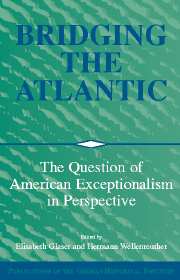Book contents
- Frontmatter
- Introduction
- Part One Transatlantic Faiths and Beliefs
- Part Two Transatlanatic Ideologies and the Perception of the Other
- Part Three People in the Transatlantic World The Perception fo Self
- Part Four Transatlantic Politics and Economics
- Part Five Transatlantic History and American Exceptionalism
- 11 Transatlantic History as National History?: Thoughts on German Post-World War II Historiography
- 12 American Exceptionalism as National History?
- 13 The Historical World of Erich Angermann
- Index
12 - American Exceptionalism as National History?
Published online by Cambridge University Press: 05 January 2013
- Frontmatter
- Introduction
- Part One Transatlantic Faiths and Beliefs
- Part Two Transatlanatic Ideologies and the Perception of the Other
- Part Three People in the Transatlantic World The Perception fo Self
- Part Four Transatlantic Politics and Economics
- Part Five Transatlantic History and American Exceptionalism
- 11 Transatlantic History as National History?: Thoughts on German Post-World War II Historiography
- 12 American Exceptionalism as National History?
- 13 The Historical World of Erich Angermann
- Index
Summary
I would like to start out from two seemingly contradictory premises. The first is that every national history, American or non-American, is based on a more or less dominating and comprehensive notion of exceptionalism. In other words, exceptionalism is one of the fundamental driving forces impelling the writing of national history. However - and this is my second premise - no serious work on national history can ever rest on exceptionalism alone. In order to satisfy the critical reader it also has to take into consideration supranational structures and contexts. In surveying the history of American national historiography we observe that much of it has been dominated by exceptionalism, that is, by the emphasis on what is usually called “the uniqueness of the American historical experience.” This observation does not, however, do justice to American national historiography in its entirety. Since the time when the study of history became professionalized in the United States, many American historians have also emphasized the transatlantic contexts of the history of the United States, the different aspects of ethnic and national Old World heritage, as well as the combined impacts of European ideas, institutions, inventions, and ways of thinking, that is, all those elements that came to America with the immigrants and helped shape the unique and in many ways exceptional history of American society. It also must be noted that since the colonial period of American history a very great number of European visitors were deeply impressed with the otherness and uniqueness of mentalities, social structures, and political institutions they had encountered in the New World.
- Type
- Chapter
- Information
- Bridging the AtlanticThe Question of American Exceptionalism in Perspective, pp. 265 - 276Publisher: Cambridge University PressPrint publication year: 2002
- 6
- Cited by



